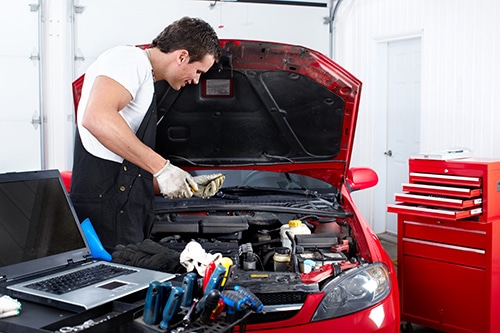Radiator Repair & Replacement
When your vehicle’s radiator begins to fail, the cooling system will exert much effort to keep the temperature of the engine at reasonable levels. When you look at the temperature gauge, and it’s unusually high, have your vehicle checked immediately.

The Radiator
The car’s radiator is vital to prevent the engine from overheating. As the engine runs, it gives off heat, and the coolant flows through the engine to help eliminate excess heat. The coolant then goes through the radiator, which lowers the coolant’s temperature and sends it back to the engine to repeatedly remove the heat.
The radiator has two tanks, which are connected through tubes that are normally made of aluminum or brass. When the coolant flows through the tubes, the radiator’s fan blows air across the coolant to reduce the temperature.
Normally, the tanks are made of plastic, and one of the radiator’s usual faults is that the tanks tend to crack and leak coolant. If this occurs, the engine will risk overheating, which may cause your vehicle’s engine long-term damage.
Other signs that your coolant system may need to be serviced include:
- Warning/indicator lights illuminate.
- Steam comes out from the motor.
- There are signs of fluid loss or leakage.
- The temperature gauge shows that your vehicle is running hotter than normal.
When a repair is warranted, professional technicians will:
- Inspect thoroughly the antifreeze/coolant system.
- Do some fixes. If necessary, they will replace components.
- Replace old antifreeze/coolant with new liquid.
If the radiator system is considerably damaged, you may need to replace your vehicle’s radiator. When you entrust your car to Super Discount Transmissions, the mechanics will give you sound advice if a full replacement or repair is your car’s most viable option.
Radiator Repair
Replacing a damaged radiator will ensure the rest of your engine’s long-term health. It will protect and lubricate your car’s water pump, help make sure your vehicle has optimal performance and power, and ensure your engine will perform better all year-round.
A functional radiator protects your car’s heater core, and can help prevent the core from freezing during winter or overheating during the summers. A functional radiator can help reduce engine corrosion, which can lead to costly damage to the engine.
To keep your radiator in tip-top shape, maintain it regularly, and do the occasional radiator flush to help remove any pipe buildup.

Radiator Replacement
Every vehicle normally has a maintenance schedule, which includes coolant replacement during a tune-up. This can be from 25,000 to 40,000 miles. Coolant replacement can help prevent issues when it comes to delivering coolant to the engine.
Overheating can lead to cracks in the radiator tanks, which can lead to major damage if not replaced or repaired immediately. The usual signs of your radiator needing replacement are regular engine overheating or coolant seeping from the engine. You may notice the coolant seep out if your vehicle is stationary, and there is a small puddle of yellow or red fluid under your car. If you see this, bring your car to the experts to avoid serious damage.
If you are in the Phoenix, Arizona area, and your radiator or any other part of your car needs servicing or replacement, head over to Super Discount Transmissions. Let the professionals handle your problem so you can drive your car worry-free.
